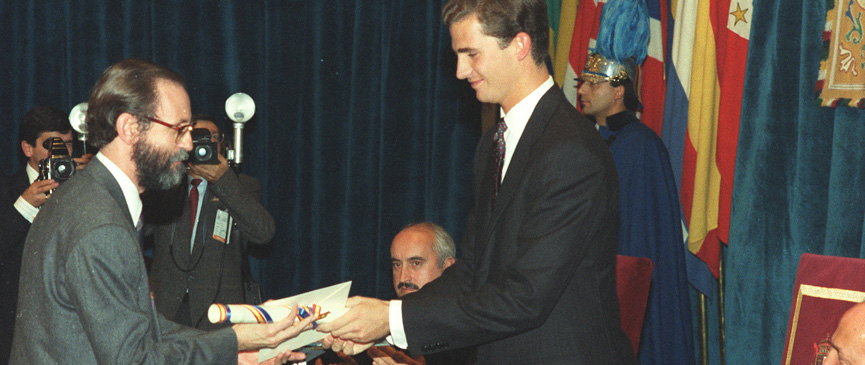You are in:
Laureates
Start of main content
Francisco Bolívar Zapata
Prince of Asturias Award for Technical & Scientific Research 1991

Luis María Anson (Madrid, Spain, 1935 - ), founder of the La Razón newspaper (1998), is a journalist and writer, member of the Royal Spanish Academy (RAE) and member of Spain’s Royal Academy of Doctors. He was chairman of the EFE news agency from 1976 to 1983, editor of the ABC newspaper from 1982 to 1997 and subsequently chairman of the Televisa España group (1997). He has also chaired the Madrid Press.
Association, the Federation of Spanish Press Associations and the Ibero-American Federation of Journalist Associations. His vocation as a journalist led him to publish his first articles at the age of thirteen and to edit the school magazine at the age of fifteen. He gained admission to the Official School of Journalism in 1954, graduating top of his class in 1957. He began writing for the ABC newspaper in 1953, becoming a regular contributor in 1954. He successively worked as news writer, desk chief, news editor and subeditor, as well as editor of the Sunday supplement.
He has been a member of the Privy Council of the Count of Barcelona and secretary of Information of his Political Secretariat, until the dissolution of both bodies (1969). His article “La monarquía de todos” [Everyone’s Monarchy], published in ABC on 21st June 1966, resulted in the newspaper being confiscated and forced Luis María Anson to go into exile for a year. In September 1975, he served as secretary of the information office created by the Count of Barcelona, whose “specific mission was to channel the relations between the head of the Spanish Royal House and the social media”. As a news writer for the ABC newspaper in Madrid, he travelled widely throughout Europe and much of Asia and Africa. He has visited 128 countries, having been a correspondent in Hong Kong and a war correspondent in the Congo and Vietnam. He also covered Paul VI’s trip to Palestine.
Lecturer at Madrid’s Official School of Journalism, in January 1970 he was appointed deputy director of this institution and formed part of the team that reassigned journalism studies to the University. He founded the El Imparcial digital newspaper on 23rd January 2008, of which he is also chairman.
Among other books, he has written Antología de las mejores poesías de amor de la lengua española (2000), Don Juan (1994), El Gengis Kan Rojo (1960), El grito de Occidente (1965), El grito de Oriente (1965), La hora de la monarquía (1958), La monarquía, hoy (1957), La negritud (1971) and Sobre la creación poética (1962).
He was appointed subeditor of ABC in September 1971. In 1960, he was awarded the Luca de Tena Prize for a piece on the catastrophe of Agadir and, in 1964, the Mariano de Cavia Prize. He served as editor of Blanco y Negro in 1975 and Gaceta Ilustrada in 1976. In January 1975, he received the Víctor de la Serna Award, granted by the Board of the Press Association for the best piece of journalism in 1974. In 1977, he became one of the first winners of the González-Ruano Prize for Journalism. He holds honorary degrees from the Universities of Mexico and Lisbon. He served as editor of Blanco y Negro in 1975 and Gaceta Ilustrada in 1976. Elected to the Royal Spanish Academy (RAE) in 1996, he took possession of his seat as a full member at the beginning of 1998 sponsored by Fernando Lázaro Carreter.
End of main content
Sección de utilidades
Fin de la sección de utilidades
- Legal document Legal document (Access key 8)
- | Privacy policy Privacy policy (Access key )
- | Social networks ???en.portal.pie.menu107.title???
- | Cookies ???en.portal.pie.menu110.title???
- | Site map Site Map (Access key 3)
- | Contact Contact (Access key )
- | XHTML 1.0
- | CSS 2.1
- | WAI 'AA
© Copyright 2024. FUNDACIÓN PRINCESA DE ASTURIAS



